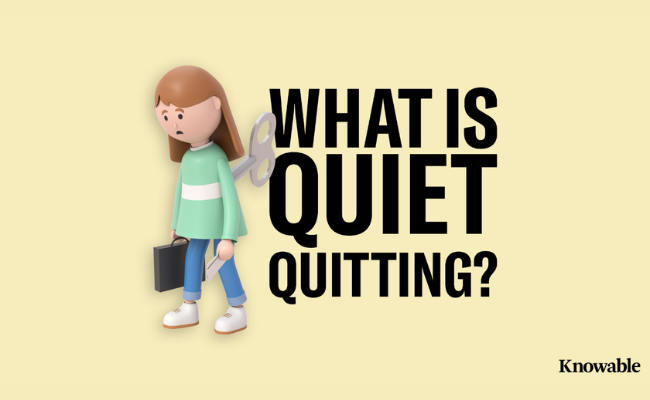Quiet Quitting: Fully Explained

A unique trend in the global job market is spreading worldwide. Ironically, it involves “quitting” while you continue to work for your current employer: quiet quitting.
If you are thinking of riding the bandwagon, you should understand the possible reasons why you feel compelled to quit. After all, you want to make the right long-term choices.
This article will explore the concept of quiet quitting and how it expands in an office setting. More importantly, we will discuss why people quit quietly and what it could do to your career.
What is quiet quitting?

Photo Credit: medium.com
This interesting trend started where all the unique internet challenges originate: TikTok. According to the World Economic Forum, quiet quitting started from Zaid Khan’s TikTok clip. The 24-year-old software engineer and musician explained it in the following terms:
“You’re still performing your duties, but you’re no longer subscribing to the hustle culture mentality that work has to be your life.”
How did the trend spread worldwide?
The term #QuietQuitting has gathered over 17 million views on the platform. Then, press articles reported on the trend and spread it further on other social media like LinkedIn and Twitter.
Is the New York worker the sole reason for the term quiet quitting spreading worldwide? No, it is the unexpected effect of the COVID lockdowns. Most workers lost their jobs, while others struggled to get by with little to no pay.
Billions of people had to stay indoors due to the strict guidelines. These conditions left them no choice but to spend more time at home. In response, they had more time to reflect on their life.
They began to think about their current job and how it impacts their mental health. Some realized that additional work might help pay the bills, but they had less time for family and friends.
Eventually, they started to reflect on the current work cultures that breach healthy boundaries. Does their company have control over their lives beyond the clock to demand extra work?
Workers also saw other people enjoying their livelihoods. They seem to love what they do but do not have to stay in office cubicles. After asking these questions and seeing the passion economy, workers decided to follow quiet quitting.
What are the signs of quiet quitting?
Workers follow the trend by doing the bare minimum that they need to do in the workplace. They refuse to do more work and leave immediately at the end of their shifts. Also, they do not accept extra work or overtime.
Quiet quitters often stay away from other employees to avoid conversations that are unrelated to their job description. Also, they usually do not share comments or suggestions during meetings.
Unfortunately, some followers of this idea take it too far. These employees may not show up on time for meetings. Moreover, some quiet quitters fail to do their fair share of the work in group projects.
These workers may also finish their outputs at the last minute. As a result, these signs of quiet quitting may bring a reduction in productivity among employees.
You might think that Gen Z is the only demographic following the trend. Contrary to popular belief, more age groups are quiet quitting worldwide nowadays.
Perhaps your coworkers are already quite quitting the workplace. You might notice the signs during Zoom calls if you work from home. Maybe you are already doing it!
Why are people going against hustle culture?
It is easy to dismiss the quiet quitting trend as laziness from Gen Z and younger generations. Yet, history shows we had several versions of this trend dating back to the 1900s.
Workers in the United Kingdom have been putting enough effort not to get fired without exerting more. Instead of quiet quitting, they followed an idea called “work to rule” for centuries.
In 1938, the French government nationalized railways and banned worker strikes. However, the employees knew that the law required engineers to confirm the safety of any bridge used by trains.
The workers called for the inspection of every bridge. As a result, engineers had to consult every crew member and prevented the trains from running on time.
In 1968, over 2,000 Air Canada employees used work to rule by strictly following the airline’s rules and regulations. They avoided the usual shortcuts, so passengers experienced significant delays. As a result, the airline settled with the workers.
Nowadays, we have quiet quitting instead of work to rule. Yet, people follow the online trend for the same reasons, such as not earning enough income and a lack of healthy boundaries.
Not enough pay
People need more money to meet their basic needs nowadays. Unfortunately, the global pandemic removed many employees from the workforce.
Some were able to return to their old office or find a new job. However, other worldwide factors made post-COVID life harder for people. We are experiencing runaway inflation in all countries nowadays.
In other words, everything is becoming more expensive. People realize their current pay is insufficient, so they take on extra work. Some have found a part-time workplace, while others took on a remote job.
As a result, life became more focused on work. Every week left other aspects of life unsatisfied. For example, they may neglect their family to get paid more.
Employees realized that they were “living for the weekend.” Worse, some realize their current wage is insufficient to meet daily necessities. Believe it or not, a job may cause people to lose money instead of earning it.
Public transportation costs have been skyrocketing due to high fuel costs. Also, the price of food and other commodities seems to increase weekly. As a result, people may spend more money than they earn.
Now, more of them adhered to the quiet quitting movement. These people see that a job cannot help them afford the cost of living, so they withdraw from the workforce altogether.
Lack of career advancement

Photo Credit: medium.com
Why are people not going above and beyond in the workplace? We may find answers in China and the “burden of the three mountains”: housing, education, and healthcare.
Alfred Wu, associate professor at the Lee Kuan Yew School of Public Policy, explained that private tuition had become necessary to stand out in the current job market. After paying exorbitant fees, they compete for a few jobs against too many people.
University graduates have no choice but to start their careers with “humble jobs.” Moreover, society pressures them to have more kids as they struggle to support them. As a result, Gen Z and other young people have lost hope.
They feel like “they cannot change their life.” Consequently, the sentiment grew to a unique version of quiet quitting in 2021 called “tang ping” or “lie flat.”
It started from a social media post calling young people to “reject the crushing pace of life, relentless competition and the empty promise of consumerism.”.
Now, the story has progressed into a new form this year. The “lie flat” movement has transformed into “bai lan,” meaning “let it rot.” The term comes from basketball, where teams would give up when losing a match.
Wu said that employers worry it is a “race-to-the-bottom culture.” Students might not perform their best as they join a workplace. On the other hand, young workers see it as an answer to burnout from excessive companies.
Alienation from work
Remember when we mentioned the “passion economy?” People saw others on the internet who felt satisfied with their job. They were going above and beyond even if they did not earn much.
We could see the reasons for quiet quitting in the words of Karl Marx. Before we continue, note that this article only uses his works as an example. Marx coined “alienation from work” in his book Economic and Philosophical Manuscripts of 1844.
People feel accomplishment whenever they can attribute their work to themselves. Also, they love it when they can serve other people’s lives with their products or services.
Nowadays, most people work to get paid. They may not feel they create something or perform specific tasks that enrich other people’s lives. Also, their clients probably have no idea of their efforts.
Some employers do not expect such goals in the first place. Instead, they expected workers to generate profit on their behalf. In response, employers may feel dissatisfied with their jobs.
Quiet quitting becomes attractive when people feel disengaged with their daily efforts. As a result, more people experience burnout and join the global movement.
Employers go beyond the workplace
Famous Shark Tank judge Kevin O’Leary said that he rejects quiet quitting. He told CNBC that going above and beyond is a must for people to enjoy their later years. Sadly, some companies take their control of employee time to the extreme.
Some employers expect workers to spend overtime, sometimes for little to no pay. Modern Japanese work culture even works people to death. The country even has the word “karoshi,” meaning “death from overwork.”
A company might even call employees during the weekends. Some may require workers to render overtime during those rest days. As a result, people may have less time with their kids or friends.
Some people say that quiet quitting is easier with remote work. After all, you only need to meet your officemates via video conferencing. However, some companies are more intrusive toward remote workers.
They may require employees to install time tracking software. It helps bosses keep track of employee time, but some apps access the camera, microphone, and even the mouse.
Stop moving your mouse; the tracker may think you are slacking off. As a result, you might not get paid your usual rate as a penalty. Also, the trackers may seem creepy because you never know if it is checking how your kids and family are doing.
Constant surveillance can feel stressful, especially if it reaches your home. As a result, quiet quitting becomes a more attractive idea. You might feel you do not get paid enough to lose privacy!
Impact of quiet quitting on employees
As “quiet quitters” take a step back, execs and experts argue the decision could damage careers and companies https://t.co/xt397ocAZe
— TIME (@TIME) September 5, 2022
The online movement has been spreading worldwide due to widespread worker burnout. If the idea seems appealing, you may want to consider a few of its negative consequences.
First, money is becoming more critical due to current economic conditions. US Treasury Secretary Janet Yellen recently admitted that there is “certainly a risk” of recession.
This statement comes after she denied such a possibility in July 2022. If you leave your current job, do you have a specific idea of how you will meet your daily needs?
You could follow your passion by becoming an online influencer or an entrepreneur. However, you will have to expect the chances of failure for these career paths.
Second, you might not have any way to return to the workforce. According to the Bureau of Labor Statistics, nonfarm employment increased by 5.8 million in the past 12 months.
Business owners are happy about the job market boom but expect it to fade soon. Matthew Luzzetti, the chief US economist of Deutsche Bank, said that the Federal Reserve would likely raise interest rates further to fight inflation.
Luzzetti predicts a potential downturn by the middle of 2023. Fail to get another job before that time, and you might not be able to find one. As a result, you might not be able to afford the ever-increasing cost of living.
Conclusion
The past two years of the global pandemic gave people time to consider their current career paths. Some realized the current employment conditions were not worthwhile, so they followed the quiet quitting movement.
If you follow this trend, you may want to take some time to reconsider. If you feel burnout, perhaps a lifestyle change could help. For example, you could try a hobby during the weekends.
Proper diet and exercise could give you more energy during work hours. Also, meditation could relax your mind and reduce stress and anxiety.
Frequently asked questions
Is quiet quitting real?
Yes, people are following the trend worldwide due to various reasons. Some feel they cannot advance in the job market, while others do not earn enough.
Why are people quiet quitting?
Some people do not feel satisfied with their current roles. Meanwhile, others do not earn enough money to meet their daily necessities.
Where did the term quiet quitting originate?
The term quiet quitting became famous from a TikTok clip. Zaid Khan explained that he only does the bare minimum to do more things besides work.







